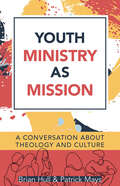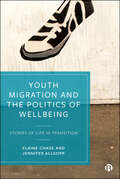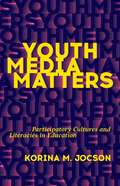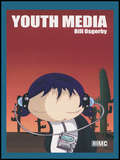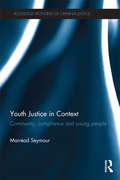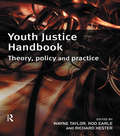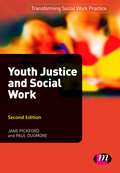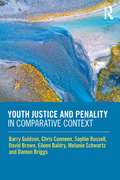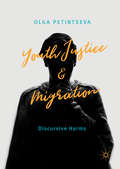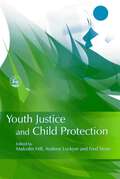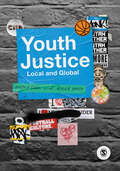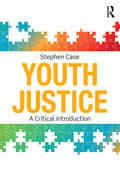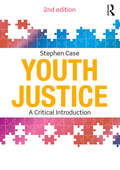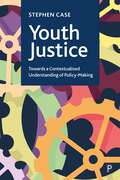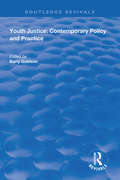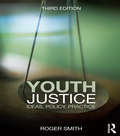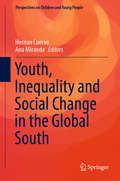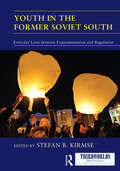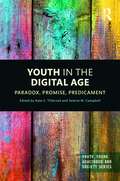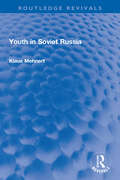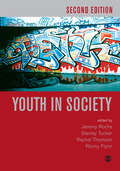- Table View
- List View
Youth Ministry as Mission: A Conversation About Theology and Culture
by Brian Hull Patrick MaysEquipping youth ministers with the tools of a crosscultural missionaryThe parallels between ministry within youth culture and global missions have long been touted by youth ministry experts, yet few resources exist to help youth workers benefit apply the insights of missiologists. In Youth Ministry as Mission, Brian Hull and Patrick Mays fill this gap with an introduction to missiology, missions practice, and missionary witness tailored especially for a youth ministry context.Youth ministers will discover missiological language that not only describes realities they face regularly, but also provides practical cross-cultural activities that translate well to youth ministries. Hull and Mays address issues such as these:• Avoiding ethical relativism while understanding historical and methodological changes in missions• Translating stories and practicing storytelling as preparation for witnessing• Training for witness in a multi-religious contextYouth Ministry as Mission will be a valuable guide for college and seminary students but will also be a breath of fresh air to those already working as youth directors and youth ministers.
Youth Migration and the Politics of Wellbeing: Stories of Life in Transition
by Elaine Chase Jennifer AllsoppThis book examines the factors affecting the health and wellbeing of young people as they transition to adulthood under the shadow of migration control. Drawing on unique longitudinal data, it illuminates how they conceptualize wellbeing for themselves and others in contexts of prolonged and politically induced uncertainty. The authors offer an in-depth analysis of the experiences of over one hundred unaccompanied young migrants, primarily from Afghanistan, Albania and Eritrea. They show the lengths these young people will go to in pursuit of safety, security and the futures they aspire to. Interdisciplinary in nature, the book champions a new political economy analysis of wellbeing in the context of migration and demonstrates the urgent need for policy reform.
Youth Media Matters: Participatory Cultures and Literacies in Education
by Korina M. JocsonIn an information age of youth social movements, Youth Media Matters examines how young people are using new media technologies to tell stories about themselves and their social worlds. They do so through joint efforts in a range of educational settings and media environments, including high school classrooms, youth media organizations, and social media sites. Korina M. Jocson draws on various theories to show how educators can harness the power of youth media to provide new opportunities for meaningful learning and “do-it-together production.” Describing the impact that youth media can have on the broader culture, Jocson demonstrates how it supports expansive literacy practices and promotes civic engagement, particularly among historically marginalized youth.In Youth Media Matters, Jocson offers a connective analysis of content area classrooms, career and technical education, literary and media arts organizations, community television stations, and colleges and universities. She provides examples of youth media work—including videos, television broadcasts, websites, and blogs—produced in the San Francisco Bay Area, Los Angeles, New York, and St. Louis. At a time when educators are increasingly attentive to participatory cultures yet constrained by top-down pedagogical requirements, Jocson highlights the knowledge production and transformative potential of youth media with import both in and out of the classroom.
Youth Media
by Bill OsgerbyPart of the successful Routledge Introductions to Media and Communications series which provides concise introductions to key areas in contemporary communications, Bill Osgerby's innovative Youth Media traces the development of contemporary youth culture and its relationship with the media. From the days of diners, drive-ins and jukeboxes, to today's world of iPods and the Internet, Youth Media examines youth media in its economic, cultural and political contexts and explores: youth culture and the media the 'Fab Phenomenon': markets, money and media generation and degeneration in the media: representations, responses and 'effects' media, subculture and lifestyle global media, youth culture and identity youth and new media. Analyzing the nature of different forms of communication as well as reviewing their production and consumption, this is an essential introduction to this key area in communication and cultural studies.
Youth Justice in Context: Community, Compliance and Young People (Routledge Frontiers of Criminal Justice)
by Mairéad SeymourYouth Justice in Context examines the influence of legislative, organizational, policy and practice issues in shaping what constitutes compliance and how non-compliance is responded to when supervising young offenders in the community. It also addresses the impact of adolescent developmental immaturity and social and personal circumstances in mediating expectations of compliance. A central concern of the book is to explore the manner in which compliance changes over time through the dynamics that arise in the supervisory relationship between practitioners and young people, and against the backdrop of the social and psychological changes that occur in adolescents’ lives as they move towards early adulthood. A detailed examination is provided based on the perspectives of probation and youth justice professionals operating across different organizational contexts, and of young people subject to community supervision. To this end, the book offers in-depth analysis on the strategies employed by practitioners in promoting compliance and responding to non-compliance. It also provides unique insights into young people’s perceptions of the supervision process, their motivations to comply, and their perspectives on desistance from offending. This book offers an alternative perspective to policies and practices that focus primarily on stringent enforcement and control measures in responding to non-compliance. Youth Justice in Context is suited to academics, researchers, students, policy makers, social workers, probation officers, youth justice workers, social care workers and other practitioners working with young people in the criminal justice system.
Youth Justice Handbook: Theory, Policy and Practice
by Wayne Taylor Rod Earle Richard HesterWhat knowledge and skills do you need to practise effectively as a professional within the youth justice system? What values should inform your work with children and young people subject to criminal justice sanctions? These are the central questions addressed by the editors and contributors in this comprehensive new text.The Youth Justice Handbook provides an essential resource for practitioners in youth justice as well as those who are studying the subject as part of their training or an academic course. Its aim is to equip practitioners in youth justice and the wider children’s workforce with an understanding of key theoretical concepts from a range of disciplines that might inform and enhance their work. It encourages a critical interrogation of the ideas that underpin practice by drawing on social constructionist approaches to issues such as ‘child development’, ‘crime’ and ‘punishment’ and related concepts. It provides a descriptive account of current practice inareas such as community corrections and incarceration, examining the evidence base for this and suggesting – where appropriate – alternative strategies.The key objective of the Handbook is to provide students with the confidence to critically reflect on the ideas and debates that currently influence the work undertaken with young people as well as those that may shape practice in the future. By equipping them with the basic skills of analysis and an understanding of key themes and developments, it aims to further promote their progression as reflective practitioners and autonomous learners.The Youth Justice Handbook takes a multidisciplinary approach, and contains chapters from leading experts in the field which draw on original research and practical experience of working in the area. It is divided into five parts:• Contexts of childhood and youth• Research, knowledge and evidence in youth justice• Policy, possibilities and penal realities in youth justice• Reflective practice• Widening contexts
Youth Justice and Social Work
by Paul Dugmore Jane PickfordStructured around the National Occupational Standards, this book takes a practical approach to youth justice within social work programmes, focusing on social work in a multi-agency, multi disciplinary youth offending team. Using case studies and research, this text helps readers to develop skills that support youth justice, as well as to understand debates in youth justice policy and practice, including the competing issues of welfare and justice. It is suitable for those on the social work degree as well as criminology and criminal justice students hoping to understand social work practice in a youth justice context.
Youth Justice and Social Work (Transforming Social Work Practice Series)
by Jane Pickford Mr Paul DugmoreIt is vital for social work students and practitioners to understand the complexities of the youth justice system. This fully revised second edition analyses and puts into context several pieces of new legislation such as the Criminal Justice and Immigration Act 2008, the Youth Rehabilitation Order 2009 and the new Youth Conditional Caution. Carefully selected case studies and summaries of contemporary research help to underpin this accessible and essential resource. Ideal for students on placement, this new edition enables the reader to follow complex and often difficult legislation and law.
Youth Justice and Penality in Comparative Context
by Barry Goldson Chris Cunneen Sophie Russell David Brown Eileen Baldry Melanie Schwartz Damon BriggsThis book represents the first major analysis of Anglo-Australian youth justice and penality to be published and it makes significant theoretical and empirical contributions to the wider field of comparative criminology. By exploring trends in law, policy and practice over a forty-year period, the book critically surveys the ‘moving images’ of youth justice regimes and penal cultures, the principal drivers of reform, the core outcomes of such processes and the overall implications for theory building. It addresses a wide range of questions including: How has the temporal and spatial patterning of youth justice and penality evolved since the early 1980s to the present time? What impacts have legislative and policy reforms imposed upon processes of criminalisation, sentencing practices and the use of penal detention for children and young people? How do we comprehend both the diverse ways in which public representations of ‘young offenders’ are shaped, structured and disseminated and the varied, conflicting and contradictory effects of such representations? To what extent do international human rights standards influence law, policy and practice in the realms of youth justice and penality? To what extent are youth justice systems implicated in the production and reproduction of social injustices? How, and to what degree, are youth justice systems and penal cultures internationalised, nationalised, regionalised or localised? The book is essential reading for researchers, students and tutors in criminology, criminal justice, law, social policy, sociology and youth studies.
Youth Justice and Migration: Discursive Harms
by Olga PetintsevaThis book examines the implications of the professional and judicial discourses on migrant youth in the Belgian youth justice system. Drawing on a detailed study of 55 court case files and in-depth interviews with over forty youth justice professionals, the book explores the problematisations of migrant Roma and Caucasian young people in the youth justice system to argue that they result in ‘discursive harms’. It discusses the assumptions and the effects of explanations of deviant behaviour, ambiguities in representations of young people’s agency and responsibility, differing assumptions about the moral potential of Roma and Caucasian families, and the reframing of assessments in school-based reports as signals of delinquency. The book reflects on how to address the ‘discursive harms’ identified and calls for a review of protection practices and ideals from a fundamental rights perspective. This book contributes to a topic that will have increasing significance for youth justice practice in Belgium as well as the rest of Europe.
Youth Justice and Child Protection
by Malcolm Hill Andrew Lockyer Fred StoneThis book is an examination of recent developments in the areas of youth justice and child protection. It investigates how well young people and the societies in which they live are served by judicial and service systems. Consideration is given to those in care - in young offenders' institutions, foster families and residential homes - as well as those living with their families. A broad range of international experts discuss the largely segregated youth justice and children's legal and service systems in England and Wales, other parts of Western Europe and the US, and compare these with Scotland's integrated system. The implications of these arrangements are considered for the rights of children and parents on the one hand and society on the other. The contributors also provide insights into the rationale for current and proposed policies, as well as the efficacy of different systems. This book will be an important reference for policy-makers, social workers, lawyers, magistrates and equivalent decision makers, health professionals, carers, and all those working in youth justice and child protection. It is highly relevant for academics and students interested in children, citizenship, youth crime, child welfare and state-family relations.
Youth Justice: Local and Global
by Nicola Carr Roger SmithThis textbook links theory to policy and practice and takes a comparative, international focus on current issues, making it vital reading for any student of Youth Justice. The authors draw on examples from Belgium, Scandinavia, Australia, New Zealand and US – as well as the UK, and include both well founded research and their own personal practical experiences. Comprehensive learning features include: chapter objectives, case studies with questions for reflection, a glossary of key terms
Youth Justice: Local and Global
by Nicola Carr Roger SmithThis textbook links theory to policy and practice and takes a comparative, international focus on current issues, making it vital reading for any student of Youth Justice. The authors draw on examples from Belgium, Scandinavia, Australia, New Zealand and US – as well as the UK, and include both well founded research and their own personal practical experiences. Comprehensive learning features include: chapter objectives, case studies with questions for reflection, a glossary of key terms
Youth Justice: A Critical Introduction
by Stephen CaseThis book provides a comprehensive, student-friendly and critical introduction to youth justice in England and Wales, offering a balanced evaluation of its development, rationale, nature and evidence base. It explores the evolution of definitions and explanations of youth offending and examines the responses to it that constitute youth justice. Bringing together theory and practice, this book provides a balanced exposition of contemporary youth justice debates, including detailed discussions of governmental rationales and practical issues and an extensive evaluation of critical academic positions. It includes a range of features designed to engage and inspire students: ‘Stop and think’: Activities challenging students to reflect on important issues. ‘Conversations’: Discussions of key themes and issues from the perspectives and experiences of relevant stakeholders, including policy makers and activists. ‘Telling it like it is’: Testimonies giving voice to the personalised, subjective and contentious viewpoints of youth justice influencers. ‘Controversies and debates’: Prompts to stimulate students to question and critique established knowledge and understanding by considering alternative angles. ‘Recurring theme alerts’: Boxes flagging up recurring themes in the developing construction of youth offending and youth justice. This book is essential reading for students taking courses in youth justice, youth offending, youth crime, youth work and social policy.
Youth Justice: A Critical Introduction
by Stephen CaseThis book provides a comprehensive, student-friendly and critical introduction to youth justice in England and Wales, offering a balanced evaluation of its development, rationale, nature and evidence base. It explores the evolution of definitions and explanations of youth offending and examines the responses to it that constitute youth justice. Bringing together theory, policy and practice, this book provides a balanced exposition of contemporary youth justice debates, including detailed discussions of governmental rationales, policy developments, practical issues and an extensive evaluation of critical academic positions. It includes a range of features designed to engage and inspire students: ‘Stop and think’: Activities challenging students to reflect on important issues. ‘Conversations’: Discussions of key themes and issues from the perspectives and experiences of relevant stakeholders, including policy makers and activists. ‘Telling it like it is’: Testimonies giving voice to the personalised, subjective and contentious viewpoints of youth justice influencers. ‘Controversies and debates’: Prompts to stimulate students to question and critique established knowledge and understanding by considering alternative angles. ‘Recurring theme alerts’: Boxes flagging recurring themes in the developing construction of youth offending and youth justice. The new edition has been fully revised and updated and includes discussion of revised National Standards in Youth Justice, the new ‘Child First’ strategic objective for youth justice, the ‘trauma informed practice’ movement, the impact of coronavirus on children in the Youth Justice System and the continued impact of austerity on policy and practice. This book is essential reading for students taking courses in youth justice, youth offending, youth crime, youth work and social policy.
Youth Justice: Towards a Contextualised Understanding of Policy-Making
by Stephen CasePolicy development and implementation has a pivotal role in the youth justice system, profoundly impacting professionals and the children they work with. This imaginative book challenges limited explanations of policy-making as linear and government-dominated through original research into the practices, identities and relationships of a wide range of stakeholders working in multiple policy- making contexts in England and Wales. The result is a detailed expert analysis of the contexts and mechanisms of youth justice policy-making. This book is key reading for researchers, professionals and students seeking effective understandings and responses to the long term social problem of youth offending.
Youth Justice: Contemporary Policy and Practice (Routledge Revivals)
by Barry GoldsonPublished in 1999, the aim of this text is to offer a critical analysis of contemporary policy and practice in relation to children and crime. It provides an integrated edited text combining a critical commentary of contemporary social/criminal justice policy with analyses of progressive practice in the UK. It offers coverage of each discrete stage in the processing of "child offenders" in the criminal justice system. It develops an alternative policy and practice framework drawing on experience from the UK, Europe, the USA, Canada, Australia and New Zealand.
Youth Justice: Ideas, Policy, Practice
by Roger SmithThe exciting new edition of this well-loved textbook offers a fully expanded and revised account and analysis of the youth justice system in the UK, taking into account and fully addressing the significant changes that have taken place since the second edition in 2007.The book maintains its critical analysis of the underlying assumptions and ideas behind youth justice, as well as its policy and practice, laying bare the inadequacies, inconsistencies and injustices of practice in the UK. This edition will offer an important update in light of intervening changes, as reflected in a change of government and shifting patterns of interventions and outcomes. This book will be an important resource for youth justice practitioners and will also be essential to students taking courses in youth crime and youth justice.
Youth, Inequality and Social Change in the Global South (Perspectives on Children and Young People #6)
by Hernan Cuervo Ana MirandaThis book gathers international and interdisciplinary work on youth studies from the Global South, exploring issues such as continuity and change in youth transitions from education to work; contemporary debates on the impact of mobility, marginalization and violence on young lives; how digital technologies shape youth experiences; and how different institutions, cultures and structures generate a diversity of experiences of what it means to be young. The book is divided into four broad thematic sections: (a) Education, work and social structure; (b) Identity and belonging; (c) Place, mobilities and marginalization; and (d) Power, social conflict and new forms of political participation of youth.
Youth in the Former Soviet South: Everyday Lives between Experimentation and Regulation (ISSN)
by Stefan B. KirmseThis book offers the first comprehensive analysis of youth, in all its diversity, in Muslim Central Asia and the Caucasus. It brings together a range of academic perspectives, including media studies, Islamic studies, the sociology of youth, and social anthropology. While most discussions of youth in the former Soviet South frame the younger generation as victims of crisis, as targets of state policy, or as holy warriors, this book maps out the complexity and variance of everyday lives under post-Soviet conditions. Youth is not a clear-cut, predictable life stage. Yet, across the region, young people’s lives show forms of experimentation and regulation. Male and female youth explore new opportunities not only in the buzzing space of the city, but also in the more closely monitored neighbourhood of their family homes. At the same time, they are constrained by communal expectations, ethnic affiliation, urban or rural background and by gender and sexuality. While young people are more dependent and monitored than many others, they are also more eager to explore and challenge. In many ways, they stand at the cutting edge of globalization and post-Soviet change, and thus they offer innovative perspectives on these processes. This book was published as a special issue of Central Asian Survey.
Youth in the Digital Age: Paradox, Promise, Predicament (Youth, Young Adulthood and Society)
by Kate C Tilleczek Valerie M CampbellYoung people spend a significant amount of time with technology, particularly digital and social media. How do they experience and cope with the many influences of digital media in their lives? What are the main challenges and opportunities they navigate in living online? Youth in the Digital Age provides answers from a decidedly interdisciplinary perspective, beginning in a framework steeped in context; biography; and societal influences on young people, who now make up 25% of the earth’s population. Placing these perspectives alongside those of current scholars and commentators to help analyse what young people are up against in navigating the digital age, the volume also draws on data from a five-year research project (Digital Media and Young Lives). Topics explored include well-being, privacy, control, surveillance, digital capital, and social relationships. Based on unique and emergent research from Canada, Scotland, and Australia, Youth in the Digital Age will appeal to post-secondary educators and scholars interested in fields such as youth studies, education, media studies, mental health, and technology.
Youth in Soviet Russia (Routledge Revivals)
by Klaus MehnertFirst published in 1933, Youth in Soviet Russia presents Klaus Mehnert’ s honest and personal account of the state of the youth in USSR. It contains themes like living human beings, student and class, student and the state, the idea of the Komsomol, the literature of the youth, youth and the theatre, the youth commune, trends and attitudes towards sex and marriage with the development of new morality. Mehnert, a German born in Russia offers valuable description of his personal experiences while living with Russian youth during four successive autumns. This book will be an essential read for scholars and researchers of history, Soviet history, Russian history, and communist history.
Youth in Society: Contemporary Theory, Policy and Practice (Second Edition)
by Jeremy Roche Stan Tucker Ronny Flynn Rachel ThomsonAre the recent policy initiatives aimed at improving life chances for young people working? Have they affected those most in need? How can young people be given more of a voice in policy making? <p><p> The new edition of this bestselling text offers a comprehensive introduction to the policy developments affecting young people in today's society, covering the areas of education and training, work, youth justice, residential care and child protection. It brings together a wide-ranging series of readings written by leading experts, to encourage those working with young people, or training to do so, to critically reflect on both the theoretical and practical dimensions of their work. <p> The themes and issues addressed in this book include: citizenship, participation and empowerment; social difference and social identity; images of youth; young people and the politics of service provision; and working with young people in different contexts. <p> This new edition has been revised in order to bring it up-to-date on contemporary policy, law and practice changes and developments. Written in a lively and engaging manner, this accessible text will be invaluable reading for students taking courses in youth and social work, social policy, youth and criminal justice and the sociology of youth. <p> Youth in Society is a set book for the Open University courses K201, Working With Young People and K268, Social Work with Young People.
Youth in Society: Contemporary Theory, Policy and Practice (2nd Edition) (Published in association with The Open University)
by Rachel Thomson Stan Tucker Jeremy Roche Ronny FlynnAre the recent policy initiatives aimed at improving life chances for young people working? Have they affected those most in need? How can young people be given more of a voice in policy making? The new edition of this bestselling text offers a comprehensive introduction to the policy developments affecting young people in today's society, covering the areas of education and training, work, youth justice, residential care and child protection. It brings together a wide-ranging series of readings written by leading experts, to encourage those working with young people, or training to do so, to critically reflect on both the theoretical and practical dimensions of their work. The themes and issues addressed in this book include: citizenship, participation and empowerment; social difference and social identity; images of youth; young people and the politics of service provision; and working with young people in different contexts. This new edition has been revised in order to bring it up-to-date on contemporary policy, law and practice changes and developments. Written in a lively and engaging manner, this accessible text will be invaluable reading for students taking courses in youth and social work, social policy, youth and criminal justice and the sociology of youth. Youth in Society is a set book for the Open University courses K201, Working With Young People and K268, Social Work with Young People.
Youth in Putin's Russia
by Elena OmelchenkoThis edited volume sheds light on the lives of young people in various central and peripheral regions of Russia, including youth belonging to different ethnic and religious groups and who have differing views on contemporary politics. While the literature continues to grow regarding the inclusion of youth in global contexts, the specific cultural, political, and economic circumstances of being young in Russia make the Russian case unique. Chapter authors focus on four key aspects that characterize the youth experience in contemporary Russia: cultural practices and value affiliations, citizenship and patriotism, ethnic and religious diversity, and the labor market. This collection will appeal to readers interested in contemporary life in Russia and looking for the latest empirical material on youth identities and cultures, as well as those looking to learn about the critical viewpoint of local academics regarding the ongoing processes in contemporary Russian society.
